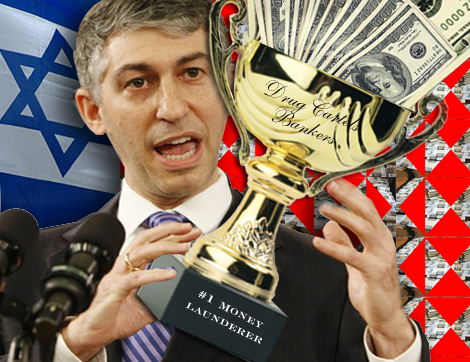
• Levey must have known current employer was financing terrorism, laundering drug money
By Keith Johnson
Did a former high-ranking United States Treasury official deliberately overlook bank criminality in order to set himself up with a plush job in the private sector?
One of the major scandals rocking the financial world involves London-based HSBC Holdings, the world’s second largest bank, which stands accused of laundering billions of dollars for Mexican drug cartels and serving as a conduit for terrorist financiers. Lurking in the background of this scandal is Stuart A. Levey, former undersecretary for terrorism and financial intelligence, who left his Treasury post in March, 2011, and now serves as chief legal counsel for HSBC. (Before 1991, HSBC was known as the Hongkong and Shanghai Banking Corporation.)
This AMERICAN FREE PRESS reporter recently interviewed James Petras, professor emeritus of sociology at Binghamton University in New York. Petras has followed Levey’s career for many years and is well informed on the laundering of Mexican drug money.
“Over the last 10 years, close to $10 billion has been laundered by HSBC,” said Petras. “And it’s been done with the complicity of an agency within the U.S. Treasury that was run by Stuart Levey.”
Petras notes that Levey got his Treasury job largely because the American Israel Public Affairs Committee (AIPAC) put the position in place and then lobbied successfully for his appointment.
“From 2004 through 2011, Levey spent most of his time organizing and pressuring companies, corporations and banks—in this country and elsewhere—to support sanctions against Iran,” said Petras. “He totally ignored warnings and public evidence about banks laundering money from the drug cartels, not only by HSBC, but also by major U.S. banks.”
According to Petras, Levey’s failure to act was so grossly negligent that it compelled members of the Senate to take matters into their own hands. “In 2008, Senator Carl Levin (D-Mich.) initiated an investigation and began to collect emails and other information on HSBC—the kind of work that Levey was supposed to do,” explained Petras.
When asked what motivated Levey to misuse his position in the Treasury, Petras said: “There’s a few theories. First, that this was simply stupidity on the part of Levey. That’s hard to believe. He graduated summa cum laude [with highest honor] from [Harvard]. He’s supposed to be one of those bright young men with an Ivy League degree.”
Petras added: “The second hypothesis is that he was so obsessed with fulfilling his role at serving Israeli interests that he gave no attention to the problem of money laundering by drug cartels affecting the U.S.”
Added Petras, “The third hypothesis is that Levey had been lining himself up for a job outside of the Treasury, and that by ignoring the activities of HSBC and other banks, he was setting himself up for a lucrative appointment that would give him a six-figure salary.”
For Petras, that seems to be the most plausible explanation, given Levey’s limited experience in the private sector. “The fact that he got a top position with HSBC suggests that it’s a reward as well as recognition of any talent that he might have,” Petras opined. “Therefore, one has to consider the possibility that HSBC rewarded Levey for overlooking their illicit activities.”
Petras goes on to say that Levey’s recent appearance before the Senate is a way of throwing sand into the eyes of U.S. investigators.
“Of course they’ve apologized, they’ve admitted guilt, and Levey is there to provide the ethical cover-up, pleading ‘we won’t do it again,’ ” he said. “But of course the banks have always promised to stop money laundering, and they always go back [on their word].”
HSBC is not the only bank under fire. Recently, MasterCard, Visa and several other lending institutions agreed to pay a $7.25 billion settlement after being accused of price-fixing on credit card transactions. Other banks are under investigation for manipulating the London inter-bank lending rate (LIBOR) in order to conceal weaknesses in the banking system and rake in more profits from speculative bets on complicated financial derivatives.
When asked what is motivating the U.S. government to spearhead this apparent crackdown, Petras said: “It allows the government to make an impression on the public that they’re doing something about the wholesale swindling of the financial sector. Let’s not forget, 90% of the U.S. people have a very negative attitude toward all of Wall Street . . . so they have to make some effort to wash their image, and to show that there is some independence between government and banking. But it’s all a sham.”
Petras is equally pessimistic about the kind of justice the government will dish out to these bankster-gangsters.
“I think this is just a slap on the wrist,” he said about the recent punishments. “Nobody is doing time. If it were a coke dealer in L.A., he’d probably get 10 to 15 years. But the money launderers that allow for billion-dollar sales get a fine. It’s a hefty fine, but when you consider the amount of money they handle, this is just peanuts.”
Keith Johnson is an independent journalist and the editor of “Revolt of the Plebs,” an alternative news website. Keith is also a licensed private detective.

